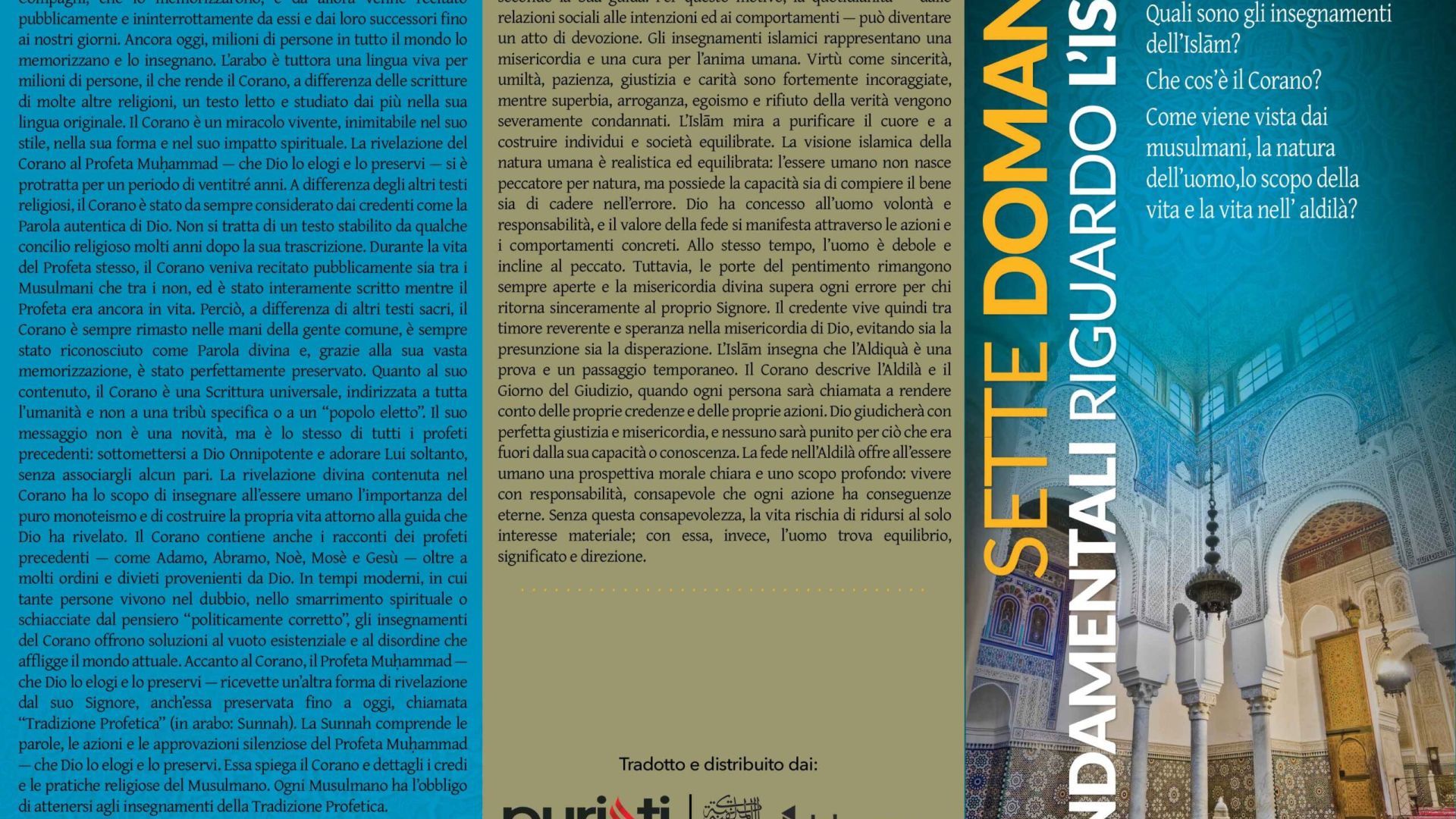Concerning the Claim: Salafiyyah Is Not from Islām
Al-ʿAllāmah Ṣāliḥ al-Fawzān
Salafiyyah is to stick to the way of the Salaf. More specifically, it is to follow Islām based on the Qurʾān and Sunnah, as the Prophet (ﷺ) taught, with the example of the Companions and those who followed them in righteousness (the first three generations and those who remained upon this purity). It is not a movement or party.
Concerning the Claim: Salafiyyah Is Not from Islām
Al-ʿAllāmah Ṣāliḥ al-Fawzān
Salafiyyah is to stick to the way of the Salaf. More specifically, it is to follow Islām based on the Qurʾān and Sunnah, as the Prophet (ﷺ) taught, with the example of the Companions and those who followed them in righteousness (the first three generations and those who remained upon this purity). It is not a movement or party.


Shaykh Ṣāliḥ ibn Fawzān al Fawzān—member of the Council of Major Scholars—refuted the contents of an article by Shaykh Muḥammad al-ʿArīfī disseminated by the ʿUkādh magazine, specifically regarding the first section entitled: “Salafī, Tablīghī, Ikhwānī: names that are not from Islām”. After praising Allāh, Shaykh Ṣāliḥ ibn al-Fawzān said:
This title is vile. Its inception stems from a meeting that was held with several scholars of Islām in which they concluded that the names ‘Salafī’ and ‘Tablīghī’ are not from Islām. I found this claim to be quite astonishing, for the term ‘Salafī’ means to closely adhere to the way of the pious predecessors—the companions and the exemplary generations that followed their guidance from the tābiʿīn and the tābiʿ tābiʿīn1. Allāh—the Most High—said:
وَالسَّابِقُونَ الْأَوَّلُونَ مِنَ الْمُهَاجِرِينَ وَالْأَنصَارِ وَالَّذِينَ اتَّبَعُوهُم بِإِحْسَانٍ رَّضِيَ اللَّهُ عَنْهُمْ وَرَضُوا عَنْهُ وَأَعَدَّ لَهُمْ جَنَّاتٍ تَجْرِي تَحْتَهَا الْأَنْهَارُ خَالِدِينَ فِيهَا أَبَدًا ۚ ذَٰلِكَ الْفَوْزُ الْعَظِيمُ
“And the first forerunners [in the faith] among the Muhājirīn and the Anṣār and those who followed them with good conduct – Allāh is pleased with them and they are pleased with Him, and He has prepared for them gardens beneath which rivers flow, wherein they will abide forever. That is the great attainment i.e., Paradise), to dwell therein forever. That is the supreme success.”
(Al-Tawbah, 9:100)
Regarding the companions, Allāh said:
إِنَّ الَّذِينَ آمَنُوا وَهَاجَرُوا وَجَاهَدُوا بِأَمْوَالِهِمْ وَأَنفُسِهِمْ فِي سَبِيلِ اللَّهِ وَالَّذِينَ آوَوا وَّنَصَرُوا أُولَٰئِكَ بَعْضُهُمْ أَوْلِيَاءُ بَعْضٍ ۚ وَالَّذِينَ آمَنُوا وَلَمْ يُهَاجِرُوا مَا لَكُم مِّن وَلَايَتِهِم مِّن شَيْءٍ حَتَّىٰ يُهَاجِرُوا ۚ وَإِنِ اسْتَنصَرُوكُمْ فِي الدِّينِ فَعَلَيْكُمُ النَّصْرُ إِلَّا عَلَىٰ قَوْمٍ بَيْنَكُمْ وَبَيْنَهُم مِّيثَاقٌ ۗ وَاللَّهُ بِمَا تَعْمَلُونَ بَصِيرٌ ﴿٧٢﴾ وَالَّذِينَ كَفَرُوا بَعْضُهُمْ أَوْلِيَاءُ بَعْضٍ ۚ إِلَّا تَفْعَلُوهُ تَكُن فِتْنَةٌ فِي الْأَرْضِ وَفَسَادٌ كَبِيرٌ ﴿٧٣﴾ وَالَّذِينَ آمَنُوا وَهَاجَرُوا وَجَاهَدُوا فِي سَبِيلِ اللَّهِ وَالَّذِينَ آوَوا وَّنَصَرُوا أُولَٰئِكَ هُمُ الْمُؤْمِنُونَ حَقًّا ۚ لَّهُم مَّغْفِرَةٌ وَرِزْقٌ كَرِيمٌ ﴿٧٤﴾ وَالَّذِينَ آمَنُوا مِن بَعْدُ وَهَاجَرُوا وَجَاهَدُوا مَعَكُمْ فَأُولَٰئِكَ مِنكُمْ
“Verily, those who believed, emigrated, strove hard and fought with their property and their lives in the cause of Allāh as well as those who gave (them) asylum and help—these are (all) allies to one another. And as to those who believed but did not emigrate (to you O Muḥammad (صلى الله عليه وسلم)), you owe no duty of protection to them until they emigrate, but if they seek your help in religion, it is your duty to help them except against a people with whom you have a treaty of mutual alliance, and Allāh is the All-Seer of what you do. And those who disbelieve are allies to one another, (and) if you (Muslims of the whole world collectively) do not do so (i.e. become allies, as one united block with one Khalīfah – chief Muslim ruler for the whole Muslim world to make victorious Allāh’s Religion of Islamic Monotheism), there will be Fitnah (wars, battles, polytheism, etc.) and oppression on earth, and a great mischief and corruption (appearance of polytheism). And those who believed, and emigrated and strove hard in the cause of Allāh (Al-Jihād), as well as those who gave (them) asylum and aid; – these are the believers in truth, for them is forgiveness and rizqun karīm (a generous provision i.e. Paradise). And those who believed afterwards, and emigrated and strove hard along with you”
(Al-Anfāl, 8:72-75)
And Allāh—the Most High—said in Sūrah Ḥashr:
لِلْفُقَرَاءِ الْمُهَاجِرِينَ الَّذِينَ أُخْرِجُوا مِن دِيَارِهِمْ وَأَمْوَالِهِمْ يَبْتَغُونَ فَضْلًا مِّنَ اللَّهِ وَرِضْوَانًا وَيَنصُرُونَ اللَّهَ وَرَسُولَهُ ۚ أُولَٰئِكَ هُمُ الصَّادِقُونَ ﴿٨﴾ وَالَّذِينَ تَبَوَّءُوا الدَّارَ وَالْإِيمَانَ مِن قَبْلِهِمْ يُحِبُّونَ مَنْ هَاجَرَ إِلَيْهِمْ وَلَا يَجِدُونَ فِي صُدُورِهِمْ حَاجَةً مِّمَّا أُوتُوا وَيُؤْثِرُونَ عَلَىٰ أَنفُسِهِمْ وَلَوْ كَانَ بِهِمْ خَصَاصَةٌ ۚ وَمَن يُوقَ شُحَّ نَفْسِهِ فَأُولَٰئِكَ هُمُ الْمُفْلِحُونَ ﴿٩﴾ وَالَّذِينَ جَاءُوا مِن بَعْدِهِمْ يَقُولُونَ رَبَّنَا اغْفِرْ لَنَا وَلِإِخْوَانِنَا الَّذِينَ سَبَقُونَا بِالْإِيمَانِ وَلَا تَجْعَلْ فِي قُلُوبِنَا غِلًّا لِّلَّذِينَ آمَنُوا رَبَّنَا إِنَّكَ رَءُوفٌ رَّحِيمٌ
“(And there is also a share in this booty) for the poor emigrants, who were expelled from their homes and their property, seeking bounties from Allāh and to please Him. And helping Allāh (i.e. helping His religion) and His Messenger (Muḥammad (صلى الله عليه وسلم)). Such are indeed the truthful (to what they say); And those who, before them, had homes (in Al-Madīnah) and had adopted the Faith, love those who emigrate to them and have no jealousy in their breasts for that which they have been given (from the booty of Banī al-Naḍīr), and give them (emigrants) preference over themselves, even though they were in need of that. And whosoever is saved from his own covetousness, such are they who will be the successful. And those who came after them say: “Our Lord! Forgive us and our brethren who have preceded us in Faith, and put not in our hearts any hatred against those who have believed. Our Lord! You are indeed full of kindness, Most Merciful.”
(Al-Ḥashr, 59:9)
The Prophet (صلى الله عليه وسلم) said: “This ummah will divide into seventy-three sects all of whom will all be in the Fire except for a single one”. The companions asked: “Who are they ‘O Messenger of Allāh?” He (صلى الله عليه وسلم) replied: “Those who have adopted the likeness of what myself and my companions are currently upon.” He (صلى الله عليه وسلم) also said: “Hold fast to my Sunnah and the Sunnah of the righteous, rightly-guided Caliphs after me.”
In consideration of this, Salafiyyah (ascribing to the pious predecessors mentioned in the above verses) is the absolute way of truth. It is, therefore, obligatory to persistently adopt this way while abandoning all others. For the adopters of the way of Salafiyyah are the truly saved sect—Ahl al-Sunnah wa-al-Jamāʿah (the Adopters of Sunnah, United upon it). They are the sect that shall be granted victory over all others until the Day of Resurrection. I ask Allāh to make us among them.
Furthermore, the one who ascribes to the way of Salafiyyah should acquaint himself with its principles to facilitate his adoption of it, just as he must familiarise himself with its opposing methodologies in order to firmly establish his abandonment of that which is antithetical to it. For true adoption of Salafiyyah may only be accomplished with thorough, comprehensive knowledge, coupled with an encompassing insight into its supporting evidence which facilitates discernment of truth from falsehood.2 It is woefully insufficient for one to ascribe himself to Salafiyyah while being completely ignorant of its principles and supporting evidence, or while unaware of the plots of its opponents. As Allāh said: “and those who followed them with good conduct”, that is, good conduct in relation to encompassing knowledge of their way, then good conduct in following their example by being in the middle of opposing extremes of radicalisation and extreme disregard for them, moderate atwixt excessiveness and complete negligence for their way.
A lack of the good conduct being alluded to here is illustrated by those who have falsely ascribed themselves to the Four Imams of Scholarly Jurisprudence—Abū Ḥanīfah, Mālik, al-Shāfiʿī and Aḥmad (رحمهم الله)—while opposing their creed and the principles of worship they espoused (i.e., the mad`habiīn). This is also manifested by those who indiscriminately label and declare other Muslims disbelievers, or show open, clear hostility and opposition to the Muslim rulers, or adopt any other manifestation of radicalism or extremism; such people are not Salafī but rather they are considered Khārijī (dissidents, rebels) or Muʿtazilī.3 Another example are those who show support for the statements of the Murjiʾah regarding issues of belief and disbelief.4 Such groups and those that follow them may not be considered to have truly adopted the way of the pious predecessors.
This issue is one most deserving of attentiveness and conscientiousness. For it facilitates avoidance of conflation between the methodology of the pious predecessors and those that oppose them. As for the disseminated claim that the terminology used to delineate these various opposing groups is not from Islām, this is a reckless statement, representative of an oppressive ruling, aimed at confusing the general populace.
Endnotes:
[1] Tābiʿīñ and Tābiʿ Tābiʿīn: The two generations that followed the companions of the Messenger of Allāh (صلى الله عليه وسلم), regarding which the Prophet (صلى الله عليه وسلم) said: “The best of my ummah is the generation among whom I was raised, then those who come after them and then those cone after them”. Authentic: narrated by Muslim: 2534.
[2] See the tafsīr of Yūsuf 12:108.
[3] Muʿtazilī: name for a theological school responsible for the introduction of speculative dogmatism into Islam.
[4] Murjiʾah: sect that opposes the methodology of the pious predecessors who believe that īmān (belief) exists only in the heart, not in actions and, as such, there is no disparity in belief. They postulate that the one who engages in major sin is considered to have completely perfect īmān. See Shaykh Ibn ʿUthaymīn’s statements regarding them in Liqāʾ al-Bāb al-Maftūḥ 33:19 and Sharḥ al-ʿAqīdah al-Wāsiṭiyyah 2:245.
Translated by: Riyāḍ al-Kanadī
Most Popular: Last 30 Days

Everyone’s Speech Is Subject to Acceptance or Rejection Except the Prophet (ﷺ)











